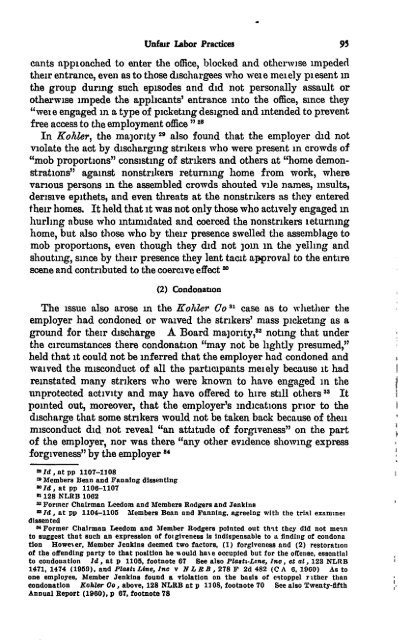TWENTY-SIXTH ANNUAL REPORT - National Labor Relations Board
TWENTY-SIXTH ANNUAL REPORT - National Labor Relations Board
TWENTY-SIXTH ANNUAL REPORT - National Labor Relations Board
Create successful ePaper yourself
Turn your PDF publications into a flip-book with our unique Google optimized e-Paper software.
Unfair <strong>Labor</strong> Practices 95<br />
cants appioached to enter the office, blocked and otherwise impeded<br />
their entrance, even as to those dischargees who weie meiely piesent<br />
the group during such episodes and did not personally assault or<br />
otherwise impede the applicants' entrance into the office, since they<br />
"wet e engaged in a type of picketing designed and intended to prevent<br />
free access to the employment office "28<br />
In Kohler, the majority 29 also found that the employer did not<br />
violate the act by discharging strikeis who were present in crowds of<br />
"mob proportions" consisting of strikers and others at "home demonstrations"<br />
against nonstrikers returning home from work, where<br />
various persons m the assembled crowds shouted vile names, insults,<br />
derisive epithets, and even threats at the nonstrikers as they entered<br />
their homes. It held that it was not only those who actively engaged m<br />
hurling abuse who intimidated and coerced the nonstrikers leturning<br />
home, but also those who by their presence swelled the assemblage to<br />
mob proportions, even though they did not join in the yelling and<br />
shouting, sines by their presence they lent tacit approval to the entire<br />
scene and contributed to the coercive effect 3°<br />
(2) Condonation<br />
The issue also arose m the Kohler Co al case as to whether the<br />
employer had condoned or waived the strikers' mass picketing as a<br />
ground for their discharge A <strong>Board</strong> majority,32 noting that under<br />
the circumstances there condonation "may not be lightly presumed,"<br />
held that it could not be inferred that the employer had condoned and<br />
waived the misconduct of all the participants mei ely because it had<br />
reinstated many strikers who were known to have engaged in the<br />
unprotected activity and may have offered to hire still others 33 It<br />
pointed out, moreover, that the employer's indications prior to the<br />
discharge that some strikers would not be taken back because of then<br />
misconduct did not reveal "an attitude of forgiveness" on the part<br />
of the employer, nor was there "any other evidence showing express<br />
forgiveness" by the employer 84<br />
si Id , at pp 1107-1108<br />
= Members Bean and Fanning dissenting<br />
"Id, at pp 1106-1107<br />
81 128 NLRB 1062<br />
"Former Chairman Leedom and Members Rodgers and Jenkins<br />
IC, at pp 1104-1105 Members Bean and Fanning, agreeing with the trial examinei<br />
dissen ted<br />
"Former Chairman Leedom and Member Rodgers pointed out tint they did not mes.n<br />
to suggest that such an expression of ft,' giveness is indispensable to a finding of condone<br />
tion However, Member Jenkins deemed two factors, (1) forgiveness and (2) restoration<br />
of the offending party to that position he would ha y e occupied but for the offense, essential<br />
to condonation Id, at p 1105, footnote 67 See also Plasts-Line, Inc , et at, 123 NLRB<br />
1471, 1474 (1959), and Pleats Line, Inc v NLRB, 278 F 2d 482 (CA 6, 1960) As to<br />
one employee, Member Jenkins found a violation on the basis of estoppel r tther than<br />
condonation Kohler Co , above, 128 NLRB at p 1108, footnote 70 See also Twenty-fifth<br />
Annual Report (1960), p 67, footnote 78

















